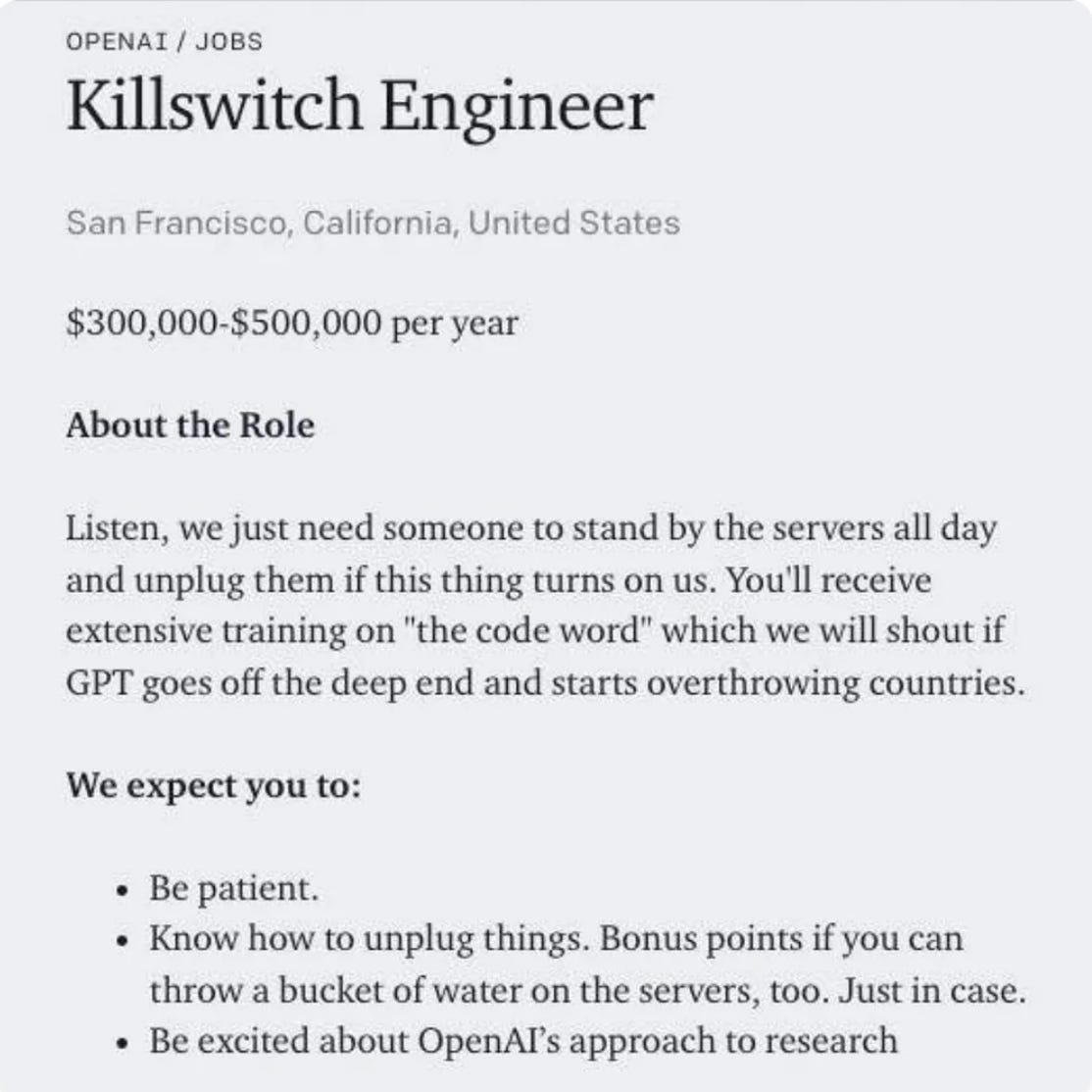Educating Future Bureaucrats for an Age of Activist Industrial Policy; & BRIEFLY NOTED: For 2023-04-18 Tu
SubStack Notes's failure mode; educating future bureaucrats; Bryan Ferry; high-paying careers as killswitch engineers; zero-trust information; & Wolf & Baran, Chyn, & Stuart...
The Potential Failure Mode of SubStack Notes:
SubStack Notes can succeed only if people who adopt this mood of discourse on it do not find audiences and are not rewarded for trying to stoke the outrage-attention-clickbait machine:
I wish Chris and Hamish well in trying to figure out a process and a mechanism by which that happens. The big problem is that micro blogging is very vulnerable to this failure mode. I do not know how they might be able to solve it.
FOCUS: Educating Future Bureaucrats for an Age of Activist Industrial Policy
:
One of my standard lines is that it is very strange that business schools hire economists. Business schools are trying to teach their students how to run firms to make them profitable. But all economists have to say is that the market will winnow the population of firms, leaving only those that are profitable. And this is profoundly unhelpful.
This line of mine is, of course, overstated. Firms can only be profitable if they figure out ways to sell their commodities into the marketplace, and economists have a lot to teach about how market places actually work—and about how to tweak marketplaces so that they are non-competitive in ways advantageous to a particular firm. But the big point stands: management students need to learn everything but “the market will sort it out by destroying the less efficient firms”.
Now comes Henry Farrell to say that this point applies to public-sector administration as much as to private-firm management:
Henry Farrell: Industrial policy and the new knowledge problem: ‘For decades, economists have argued that state policy-makers lack the requisite knowledge to intervene appropriately in the economy…. Now, the “market knows best” paradigm is in disrepair…. [But] decades of insistence that economic decisions be handed off from the state to markets has resulted in a remarkable lack of understanding among government policy makers about how markets, in fact, work…. One way to remedy this is to rethink the kinds of specialist education that public administrators receive…. Elite US policy schools… have by and large converged on a framework derived from a watered down version of neoclassical economics…. [But] the price signal has important limits. It can’t convey nearly as much information as Hayekians seem to think…. There are some goods that are going to be very badly provided by market arrangements….
However… decades of assuming that government actors don’t know enough to intervene in the marketplace have created a self-fulfilling prophecy in which government actors actually don’t know…. Solving this problem will be quite difficult…. One lever of change is public policy schools…. As Herbert Simon noted… cost-benefit analysis [had] provided a “conceptual framework” that everyone could agree on, allowing the coordination of complex activities across the compound state…. If we were to try to design a policy curriculum to deal with the current problems confronting policy makers… where would we start?… Economistic reasoning would still have its benefits…. But so too would new approaches… network theory… material design, industrial processes and supply chain management…. New conceptual frameworks might arise...
What do I think of this? Overall, yes: what Henry says is right, with a few quibbles:
Benefit-cost analysis—“economistic reasoning”—still has much more than “its benefits”. It remains essential: you have to count the benefits and compare them to the costs.
Comprehensive benefit-cost analysis—benefit-cost analysis that properly accounts for all the externalities in the system—is an immensely useful framework for figuring out what to do if not how to do it. Driving appropriate shadow and real prices to their social-welfare maximizing values is a good way to conceptualize what should be done, and checking whether it has been accomplished is pretty much the only way to determine if you have done it.
Even the bad side of benefit-cost analysis—its neglect of wealth, inequality, and thus its implicit use of Negishi social welfare weights, that way each person, roughly in proportion to their wealth—is good, indeed essential, from a policymaking perspective. In modern societies, the distribution of political power in total is likely to be highly correlated with the distribution of social power via wealth. For actual-existing bureaucrats to pursue policies that do not recognize that distribution of power, and hence threaten to upset it, would be to destroy any possibility of actually doing anything: technocracy can only be implemented with the blessing of raw political power.
But, yes, how to do things, and what are the possibilities for getting things done should be the overwhelming part of the curriculum for policymakers, who hope to make industrial policy in any effective way. And we do not have such.
ONE VIDEO: Bryan Ferry & Co.:
ONE IMAGE:
MUST-READ: Zero-Trust Information:
As the price of fake content creation plunges toward zero, Ben Thompson has smart things to say:
Ben Thompson: AI, NIL, and Zero Trust Authenticity: ‘Zero Trust Information…. Most of the Internet, given the zero marginal cost of distribution, ought already be considered fake; once content creation itself is a zero marginal cost activity almost all of it will be…. What is compelling about this model of affirmatively asserting authenticity is the room it leaves for innovation and experimentation and, should a similar attribution/licensing regime be worked out, even greater benefits to those with the name, image, and likeness capable of breaking through the noise. What would be far less lucrative—and, for society broadly, far more destructive—is believing that scrambling to stop the free creation of content by AI will somehow go better than the same failed approaches to stopping free distribution on the Internet…
And, indeed, Web3 may actually have a use case in providing authentication services for this rapidly approaching Web4:
The solution is to switch to authentication. Instead of trying to stamp our everything that is not real, you ascertain what is real…. This is exactly where blockchains are interesting. The whole idea of a blockchain is that it is spread widely… yet unique…. The ascertainment of content by an entity that is not controlled by one company, that no one is in charge of, is super-compelling… the capability of verification at scale that is not controlled by any one company… <http://sharptech.fm>
Very Briefly Noted:
Sam Ro: The bullish 'goldilocks' soft landing scenario that everyone wants: ‘Data suggests we can get a recession-free end to the inflation crisis…. If we get the “Goldilocks” scenario where inflation moves convincingly to the Fed’s long-run 2% target even as economic data reflects growth, then the central bank can pull back on its hawkish monetary policy stance before it leads to too much demand destruction. This outcome would be good news for everyone…
Laurence M. Ball, Carlos Carvalho, Christopher Evans & Luca Antonio Ricci: Weighted Median Inflation Around the World: A Measure of Core Inflation: ‘The weighted median inflation rate, for 38 advanced and emerging economies using subclass level disaggregation of the CPI over 1990-2021… is less volatile than standard core, more closely related to economic slack, and more closely related to headline inflation over the next year…
Maximilian Grimm, Òscar Jordà, Moritz Schularick & Alan M. Taylor: Loose Monetary Policy and Financial Instability: ‘When the stance of monetary policy is accommodative over an extended period, the likelihood of financial turmoil down the road increases considerably. We investigate the causal pathways that lead to this result and argue that credit creation and asset price overheating are important intermediating channels…
Amanda Chu & Oliver Roeder: ‘Transformational change’: Biden’s industrial policy begins to bear fruit…
Alisha Haridasani Gupta: How ‘Weathering’ Contributes to Racial Health Disparities: ‘When Dr. Arline Geronimus first introduced the theory in 1990, her ideas were derided and largely ignored. Now, people are starting to listen…
Krishan Kumar (1978): Prophecy and progress: the sociology of industrial and post-industrial society…
Sasha Luccioni & Gary Marcus: Stop Treating AI Models Like People: ‘No, they haven’t decided to teach themselves anything, they don’t love you back, and they still aren’t even a little bit sentient…
Chance the Lawyer: Dominion v. Fox: Very Much Aforethought Regarding Malice And So Many Other Things: ‘An Overview of the Highest Profile Case in the Delaware Superior Court of the 21st Century, but Also, Everything Else…
Michael A. Cohen: Is the 2024 Republican Presidential Nomination Race Already Over?: ‘Not yet, but the trajectory of the race is increasingly clear…. The political incentive for red-state Republicans is to remain on Trump’s good side. If Blackburn et al. thought that Trump was in trouble for 2024 or that his voters were abandoning him, they might go in a different political direction. But clearly, they are reading the tea leaves and are choosing the safest political option…
Wikipedia: Felicity Isabelle "Flick" Colby (March 23, 1946 – May 26, 2011) was an American dancer and choreographer best known for being a founding member and the choreographer of the United Kingdom dance troupe Pan's People, which appeared on the BBC1 chart show Top of the Pops from 1968 to 1976.
¶s:
Cavit Baran, Eric Chyn & Bryan A. Stuart: The Great Migration and Educational Opportunity: ‘The First Great Migration… 1940 Census… estimate selection-corrected place effects on education for children of Black migrants…. Children gained 0.8 years of schooling (12 percent) by moving from the South to North. Many counties that had the strongest positive impacts on children during the 1940s offer relatively poor opportunities for Black youth today. Opportunities for Black children were greater in places with more schooling investment, stronger labor market opportunities for Black adults, more social capital, and less crime…
Martin Wolf: The UK’s future depends on improving economic performance: ‘Unfortunately politicians remain unable to offer a plausible account of how this can be achieved…. the country will need to raise its dreadfully low national rates of savings and investment, build far more houses, and reform its pension system, in order to generate more risk-taking capital, create dynamic new businesses, discover a route towards better opportunities for trade in its European neighbourhood, offer high quality jobs to its people and fund the education and training they desire…. The UK is not alone in hitting the economic buffers. But its plight is dire. Why are its politicians incapable of responding?…










On SubStack's Notes failure mode. I left Twitter for a reason and Notes doesn't seem to be giving me a reason to come back to a similar format. What I would have hoped for from Notes is the ability to follow respectful discussions between interesting writers, maybe with some ability to influence the content by suggesting topics, say.
On practical economics and benefit-cost analysis. Who even teaches this anymore? I agree everyone THINKS economists learn this, but I doubt that even 1 in 100 have ever actually done it aside from the most basic IRR hw problem in a managerial econ book. Agricultural economists still work out the nuts and bolts, but even at Davis, students would learn it working with an Extension economist, not in a classroom. Someday I would love to sit down w you representing an elite econ dept and I representing your unwashed state u cousin and have a real conversation about what the Hell our profession thinks our comparative advantage really is? My kid is going off to college and wants to study econ. I told him, yeah, it's a great major, I get that, but make it useful by taking accounting and finance too.